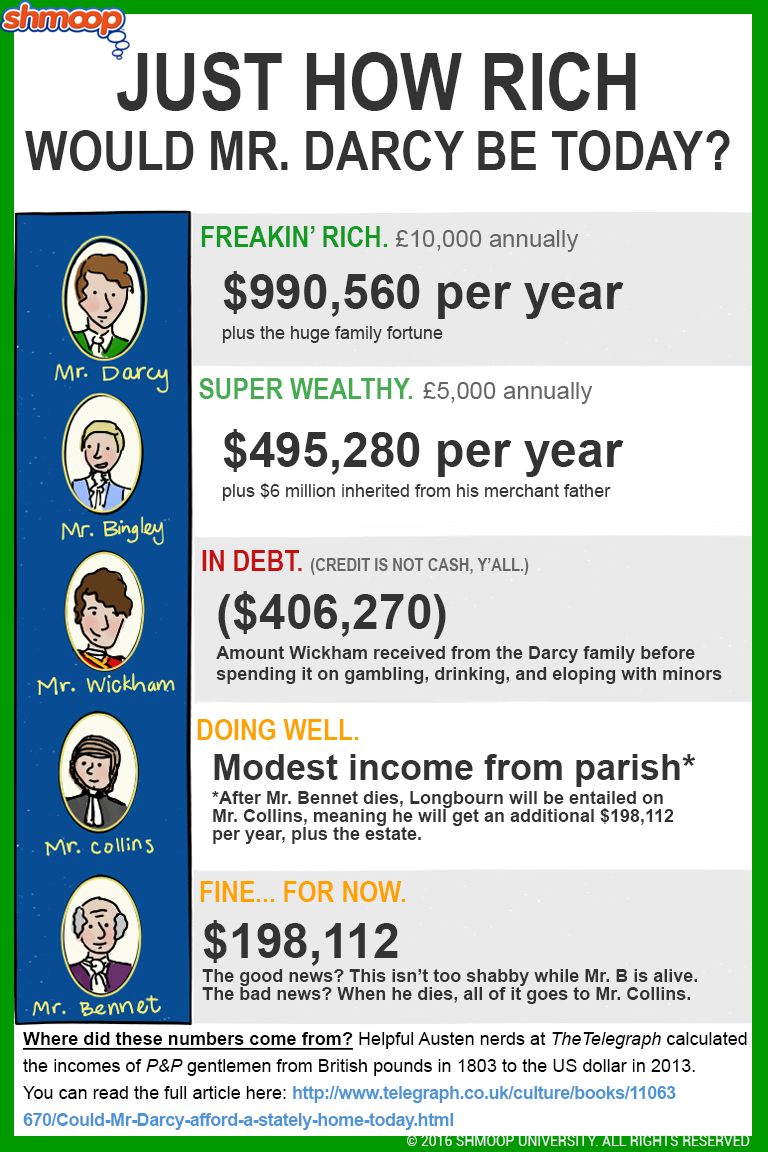Character Analysis
Pride and Prejudice is about nothing if it isn't about consequences. What do we mean? Well, think about the way romantic comedies work nowadays. Two people meet in a cute way, get separated by nonsense, and then in the end are reunited at last. It's a little bit like fairy tales, with the "happily ever after" implied and never really shown. In Austen, though, we actually get to see what the upshot of the "ever after" is, with the pretty clear sense that some "ever afters" are way better than others.
What does all that have to do with Mr. Bennet? He's suffering consequences. He made the life-changing mistake of marrying someone just because she was cute and flirty, and all it got him was a "discontented" and ridiculous wife and five daughters.
Young Love
Let's flash back to what Mr. and Mrs. Bennet's whole romance must have been like. A beautiful, fun-loving girl from a middle-class family (meaning that her dad was in trade) meets a funny guy on the lower end of the gentry totem pole. They make cow-eyes at each other, and bam! Whirlwind courtship ends in a nice wedding ceremony.
Sounds perfect, right? Not quite. The novel's genius shows us just what that initial attraction turns into after 22 years in a society in which divorce is basically impossible. It turns out that picking your wife based just on appearance and sexual chemistry isn't such a great idea. In fact, the repercussions are pretty dire.
He doesn't start drinking or buying expensive cars—the narrator tells us that "Mr. Bennet was not of a disposition to seek comfort for the disappointment which his own imprudence had brought on, in any of those pleasures which too often console the unfortunate for their folly or their vice" (42.1), which is a fancy way of saying that he doesn't become an alcoholic. Instead, he seeks comfort in being a sarcastic jerk: "To his wife he was very little otherwise indebted, than as her ignorance and folly had contributed to his amusement" (42.1). Basically, he gets his kicks making fun of his silly wife.
On the surface it might look less harmful than drinking and gambling, but it's just as destructive to his family. As Lizzy realizes as last, there's a lot of "evil" in "so ill-judged a direction of talents; talents, which, rightly used, might at least have preserved the respectability of his daughters" (42.2).

(Click the infographic to download.)
Funny Man
Still, though not a great husband or a really responsible dad, we think he's hysterical. Mr. Bennet is sarcastic, witty, and insightful. The man is frequently a bemused spectator in the midst of unpleasant situations—namely, his marriage—but he always has some pithy comment or observation to voice. Let's look at a couple:
- His response to Mrs. Bennet insisting that he make Lizzy marry Mr. Collins? "An unhappy alternative is before you, Elizabeth. From this day you must be a stranger to one of your parents. Your mother will never see you again if you do not marry Mr. Collins, and I will never see you again if you do." (18.20)
- His response to finding out that Mr. Bingley has dumped Jane? "Your sister is crossed in love, I find. I congratulate her. Next to being married, a girl likes to be crossed a little in love now and then. It is something to think of, and it gives her a sort of distinction among her companions. When is your turn to come? You will hardly bear to be long outdone by Jane. Now is your time. Here are officers enough in Meryton to disappoint all the young ladies in the country. Let Wickham be your man. He is a pleasant fellow, and would jilt you creditably." (24.26)
- His letter to Mr. Collins, announcing Lizzy and Darcy's engagement? "I must trouble you once more for congratulations. Elizabeth will soon be the wife of Mr. Darcy. Console Lady Catherine as well as you can. But, if I were you, I would stand by the nephew. He has more to give." (60.24)
These are major life events for his daughters—marriage and being "jilted" (basically, broken up with, although with much more serious consequences)—but all Mr. Bennet can do is joke about it. When it comes right down to it, Mr. Bennet may be a smart guy who loves reading, but he also has really, really poor judgment and laziness come to mind. We don't care how much Lydia begged and pestered—it was a bad decision to let her go to Brighton. And seriously, not saving money for his daughters' futures? Major fail. Rather than take an active role in his family life, Mr. Bennet prefers to hide out in his library.
Okay, pause. We have to try and make one last stand in defense of Mr. Bennet. Though he can be pretty obnoxious with his younger daughters, he does care for Elizabeth. He warns Elizabeth against marrying someone she doesn't care for or respect, saying that "unless you truly esteemed your husband … your lively talents would place you in the greatest danger in an unequal marriage. You could scarcely escape discredit and misery" (59.36). Guess he doesn't want his daughter to repeat his big mistake.
But, as with every other major realization has—save some money, make sure my daughters get some education, keep Lydia under lock and key—it's too little, too late.